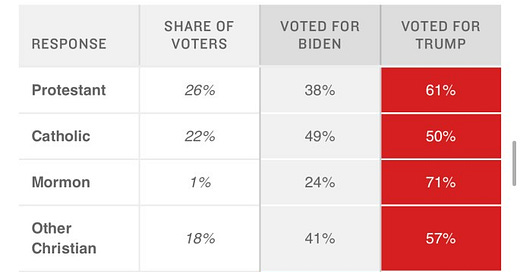The Biggest Threat to Christianity in the US
Some white Christians have set up Critical Race Theory (CRT) as the greatest danger to Christianity, but it's actually something far different.
NOTE: This post was originally published on November 7, 2020 on jemartisby.com.
Preliminary demographic data about the 2020 electorate has started rolling in. The Associated Press published the VoteCast survey that revealed some disappointing, if not altogether surprising, information.*
81 percent…Again.
Four years ago 81 percent of voters who identified as white and evangelical threw their support behind Donald. J. Trump.
Now, in a reprise of 2016 presidential election, white evangelicals continued to support Donald Trump at exactly the same rate after four years of his presidency. Four years of lies, scandals, bellicosity, chaos, and racism. White evangelicals voted for him again in droves.
These numbers raise a host of questions: Is evangelicalism more wedded to political power than the Prince of Peace? Can U.S. evangelicalism be salvaged from the grip of the modern GOP? What should racial and ethnic minorities in predominantly white evangelical spaces do in light of this voter info?
One question we should also ask is: What is the greatest threat to Christianity in the United States today?
Some white evangelicals have set up Critical Race Theory (CRT) as the most insidious menace to the integrity of the Christian faith.
What is Critical Race Theory?
Kimberlé Crenshaw, a pivotal figure in the founding of the theory describes it as, “a practice—a way of seeing how the fiction of race has been transformed into concrete racial inequities.” CRT has origins with legal scholars who examined the way race and racism gets transcribed into laws that create and perpetuate inequalities.
The fear-mongering over Critical Race Theory even reached the White House. In September, Trump issued the “Executive Order on Combating Race and Sex Stereotyping.” The purpose of the order was to “to combat offensive and anti-American race and sex stereotyping and scapegoating”–a veiled reference to Critical Race Theory and racial justice efforts that may utilize components of the theory.
But here’s another question: Is it Critical Race Theory that has caused more harm to the cause of Christ in the U.S. or is it Christian Nationalism?
According to sociologists, Samuel Perry and Andrew Whitehead, Christian Nationalism (CN) is “an ideology that idealizes and advocates a fusion of Christianity with American civic belonging and participation.”
In their book, Taking America Back for God, they go on to explain that the “Christian” in Christian Nationalism ” represents more of an ethno-cultural and political identity that denotes a specific constellation of religious affiliation, cultural values, race, and nationality.”
History attests to this amalgamation of race, religion, and nationalism.
On Thanksgiving Day 1915, a former white Methodist circuit rider gathered a group of his white male friends and they went to the top of Stone Mountain in Georgia. Etched into the gigantic stone are the visages of Confederate leaders Robert E. Lee, “Stonewall” Jackson, and Jefferson Davis.
On top of Stone Mountain, this group of white men resurrected the Ku Klux Klan. They performed a ritual that included burning a cross–an act that would soon become a symbol of white racial terrorism. They also constructed an altar and placed on it two objects: a Bible and an American flag.
The rebirth of the KKK in the Jim Crow era demonstrates the melding of race, religion, and nationalism in a toxic mixture that conflates Christ and country and seals its devotion with the promise of violence.
This is not just an issue of the past either.
Days before the November 3rd election, Idaho Lieutenant Governor, Janice McGeachin (R), released a video of her sitting in a pickup truck draped in an American Flag. McGeachin leans slightly out of the driver’s side window holding a Bible in one hand and a gun in other.
Protesting the restrictions on activity and the safety measures advised by medical professionals due the coronavirus pandemic, the Lt. Gov. said,
“We recognize that all of us are by nature, free and equal, and have certain inalienable rights. Among which are enjoying and defending life and liberty, acquiring, possessing and protecting property and pursuing happiness and securing safety.”
One could hardly draw a clearer picture of Christian Nationalism.
Christian Nationalists–a term more accurate than white evangelicals because adherents actually include evangelical Protestants, Catholics, and Mainline Protestants–are the ones voting for Trump.
As historian Kristen Kobes Du Mez explains in her recent book Jesus and John Wayne, white evangelicals, and Christian Nationalists more broadly, voted for Trump not in spite of his character, but because of it. For them, Trump represents not a betrayal of their values but a fulfillment of them.
His insults? He’s just telling it like it is.
His long history of shady business dealings? He’s the consummate deal-maker and economically savvy.
His womanizing and philandering? He’s a virile, masculine man.
His faith? Depends on who you ask…He’s either a baby Christian, God’s chosen man to bring the nation back to true Christian worship, or someone elected to serve as “Commander-in-Chief not Pastor-in-Chief.”
But what has done more damage to the witness of Christianity in the United States–Critical Race Theory and racial justice efforts generally or an allegiance to Christian Nationalism and political support for Trump?
Are Christians abandoning the “evangelical” label because people are saying “Black Lives Matter” or because some Christians cheer on a man who advocates a ban on Muslim immigration and separates children from parents at the border?
Are Black people leaving predominantly white churches because their pastors are preaching too much about racism or because they are parroting Republican talking points?
Are people leaving the Christian faith altogether because they can’t stand the talk of systemic racism and power structures or because they cannot reconcile a faith that commands adherents to “love your neighbor as yourself” with supporting a president who loves only himself?
The sad irony is that to word “evangel” means “good news.” But under Christian nationalism and Trumpism, the word evangelicals preach has become very bad news indeed.
* Edison exit polls show that 76 percent of white evangelicals voted for Trump.
———————————————————————————
But don’t take my word for it. You can read hundreds of thousands of words about the threat of Christian Nationalism and the array of cultural, political, and economic commitments in its orbit.
Here’s an incomplete list:
Divided by Faith: Evangelical Religion and the Problem of Race in America by Michael Emerson and Christian Smith
Jesus and John Wayne: How White Evangelicals Corrupted a Faith and Fractured a Nation by Kristin Kobes Du Mez
Taking America Back for God: Christian Nationalism in the United States by Samuel Perry and Andrew Whitehead
Reconstructing the Gospel: Finding Freedom from Slaveholder Religion by Jonathan Wilson-Hartgrove
American Blindspot: Race, Class, Religion, and the Trump Presidency by Gerardo Martí
The Color of Compromise: The Truth about the American Church’s Complicity in Racism by Jemar Tisby






I see this all around me. It’s scary and tragic, and actually *why* I do not like to label myself as an evangelical any longer. I need to do more digging here, but am interested in learning more about how to subvert the Christian anti-CRTs as they try to insert their narrative. I know that HTFR will also be of assistance here, as well.
This is a great piece, really appreciate the insights. Reminds me of a recent David French column along similar lines- https://frenchpress.thedispatch.com/p/the-dangerous-idolatry-of-christian
I’ve also been writing on CRT- https://kinderconservative.substack.com/p/kcb-answering-common-objections-to